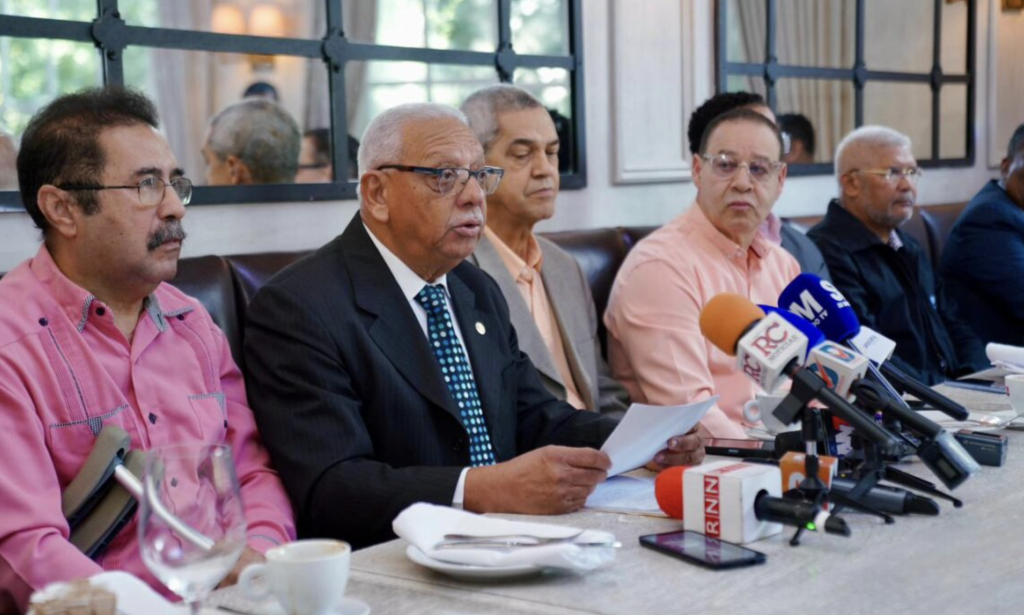
Several past presidents of the Dominican Engineers and Architects Association (Codia) now say the recent Abinader administration decision to build a monorail in Santo Domingo instead of continuing with the metro lines is a planning mistake, as reported in N Digital.
A coalition of former presidents from the Dominican College of Engineers, Architects, and Surveyors (Codia) sharply criticized the proposed Santo Domingo Monorail project, labeling it a “planning error” that is destined to be “saturated” from inception due to technical, legal, and financial limitations.
The powerful rebuke was delivered by engineer Thomás Frías Sosa on behalf of the signatories. While clarifying that the professionals are not opposed to mass transit, they warned that the chosen monorail model is “technically limited, financially risky, and legally questionable.”
Frías Sosa stressed that monorails are typically intended as complementary, not primary, transit lines, citing São Paulo, Tokyo, and Kuala Lumpur as examples, in contrast to heavy metro systems chosen by major cities like Paris, Mexico City, and Santiago, Chile.
“A system that is born at the limit of its capacity is not a solution, it is a planning error that postpones the crisis,” Frías Sosa cautioned, echoing similar concerns raised by the opposition party Fuerza del Pueblo (FP).
According to the engineers’ analysis, the Santo Domingo Monorail would have a capacity for 12,500 to 20,000 passengers per hour, per direction —a figure that already falls short of the current demand exceeding 22,000. In stark contrast, the existing Santo Domingo Metro already moves over 27,000 passengers/hour and can be expanded to 40,000 with minor upgrades.
The technical experts also disputed the assumption that a monorail is a more economical choice than a metro.
Project cost per kilometer (US$) and capacity comparison to the underground metro lines presented by the Codia engineers is:
Monorail Santiago US$79 million and lower capacity
Monorail Santo Domingo US$59–75 million and lower capacity
Metro Line 2C US$69 million and double the capacity
Furthermore, the group warned that the monorail’s proprietary technology creates a single-manufacturer dependency, which will escalate maintenance and spare parts costs. They estimate operating costs will be 10 to 15% higher, potentially leading the country to pay up to 40% more per passenger transported over three decades.
“The monorail costs the same as or more than the metro, but transports less and wears out sooner,” the statement from the past presidents of the engineering association highlights.
Beyond the expected technical flaws, the former Codia leaders raised serious issues regarding governance and compliance. These are:
Lack of safety compliance: They allege the project fails to meet international safety and risk management standards, citing the absence of multi-hazard studies and non-application of norms like NFPA 130, ASCE 7-22, or ISO 31000. They argue that monorails are unsuitable for long urban routes, leading to their rejection in most of Europe.
Fideicomiso FITRAM secrecy: The engineers questioned the transparency of the FITRAM trust responsible for managing project funds, claiming the structure prevents “citizen audit” and removes control from the Dominican Congress and Chamber of Accounts—a move they deemed “unacceptable in a modern democracy.”
Bidding irregularities: They also flagged irregularities in the tender (FITRAM-CCC-LP-2025-0001), including a brief 32-business-day window for international offers, restrictive specifications that limited competition, and a lack of requirement for proven experience in similar large-scale projects.
The professionals insisted their stance is driven solely by technical criteria, not political interests. The group, which includes former national presidents José Espinosa, Arturo Pichardo, Rafael Vásquez, and Thomás Frías Sosa, concluded:
“The Santo Domingo Monorail is a high-risk, high-cost, and low-efficiency project. We endorse the technical position of the Fuerza del Pueblo Infrastructure Commission because it aligns with the principles of sound engineering and professional ethics.”
Previously, also past president of the Codia, Teodoro Tejada had defended the choice of the monorail, arguing the high cost of displacing businesses and residences in urban areas to give way to the metro lines.
Read more:
N Digital
DR1 News
N Digital
14 October 2025

